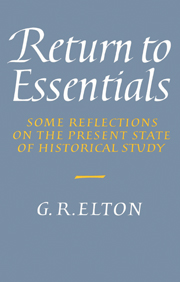THE FUTURE OF THE PAST
Inaugural Lecture as Professor of English Constitutional History in the University of Cambridge, 1968
Published online by Cambridge University Press: 05 June 2012
Summary
MR VICE-CHANCELLOR, LADIES AND GENTLEMEN
I don't entirely know what inaugural lectures are for. I do not know exactly what it is one inaugurates; and I have given some thought to the matter because it is customary, and I think nicely customary, to produce such an inauguration. It is not that I lecture for the first time, either in this University or in this room. It is a matter of record. I have a press photograph to prove it. It is not the case that the subject of Constitutional History is new in this University. On the contrary. Its ancestry is immense and the best there is in the historical field in Cambridge. I think all history professors in the last fifty years who inaugurated themselves from this desk or any other have paid their tribute to Frederic William Maitland, and I will do so, too, sincerely and with delight. As I have thought for many years, to speak in the University in which Maitland practised is a distinction which for the historian nothing else can entirely equal. And the tradition continued. We are in a sense today called upon to mourn one of our most eminent practitioners, Miss Helen Cam. To succeed somewhere along the line where she stood is once again an honour, a great honour. And the tradition still continues. I see before me one of its most eminent members whom I am very glad indeed to see present here. I am only sorry to think that we shall not hear him speak from this platform again, unless we can persuade him otherwise, some day.
- Type
- Chapter
- Information
- Return to EssentialsSome Reflections on the Present State of Historical Study, pp. 75 - 98Publisher: Cambridge University PressPrint publication year: 1991



